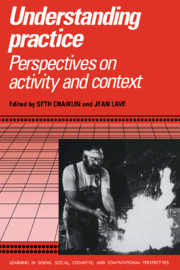Book contents
- Frontmatter
- Contents
- Series foreword
- List of contributors
- Part I Introduction
- Part II Learning craftwork
- 2 Learning to navigate
- 3 Developmental studies of work as a testbench of activity theory: The case of primary care medical practice
- 4 Re-searching psychotherapeutic practice
- 5 Thinking and acting with iron
- 6 Artificial intelligence as craftwork
- 7 Behavior setting analysis of situated learning: The case of newcomers
- Part III Learning as social production
- Part IV Conclusion
- Author index
- Subject index
- Learning in Doing: Social, Cognitive, and Computational Perspectives
3 - Developmental studies of work as a testbench of activity theory: The case of primary care medical practice
Published online by Cambridge University Press: 06 January 2010
- Frontmatter
- Contents
- Series foreword
- List of contributors
- Part I Introduction
- Part II Learning craftwork
- 2 Learning to navigate
- 3 Developmental studies of work as a testbench of activity theory: The case of primary care medical practice
- 4 Re-searching psychotherapeutic practice
- 5 Thinking and acting with iron
- 6 Artificial intelligence as craftwork
- 7 Behavior setting analysis of situated learning: The case of newcomers
- Part III Learning as social production
- Part IV Conclusion
- Author index
- Subject index
- Learning in Doing: Social, Cognitive, and Computational Perspectives
Summary
Introduction
When I write about the theory of activity, I am using a double-edged notion. On the one hand, it is necessary to emphasize the unique and self-consciously independent nature of the Soviet cultural-historical research tradition, which today is commonly called activity theory (see Leont'ev, 1978; Leontyev, 1981; Wertsch, 1981). On the other hand, this tradition is not a fixed and finished body of strictly defined statements – it is itself an internationally evolving, multivoiced activity system.
Rumors about activity theory have been around in Western behavioral and social sciences for some time. But in many ways, this theoretical approach is still one of the best-kept secrets of academia. This is partly due to language barriers, partly to the epistemological foundations of activity theory, which are not immediately transparent to scholars unfamiliar with classical German philosophy and dialectics (see Ilyenkov, 1982; Lektorsky, 1980/1984; Mikhailov, 1980 – and Bakhurst, 1991, for a careful Anglo-Saxon interpretation). And when a Western researcher begins to realize the impressive dimensions of theorizing behind the activity approach, she or he may well ask: Is it worth the trouble? Can it be used to produce something interesting? How does one do concrete research on the basis of activity theory?
This chapter aims at answering those questions, if only partially and sketchily. Others have begun such bridge building in the fields of education (Moll, 1990), language socialization (Ochs, 1988), design of computer interfaces (Bødker, 1990), and explanation of skilled action (Keller & Keller, this volume). I shall focus on expert work as collective, institutionally organized activity.
- Type
- Chapter
- Information
- Understanding PracticePerspectives on Activity and Context, pp. 64 - 103Publisher: Cambridge University PressPrint publication year: 1993
- 320
- Cited by



